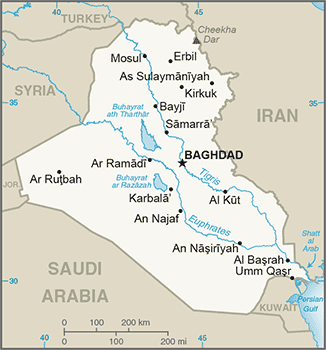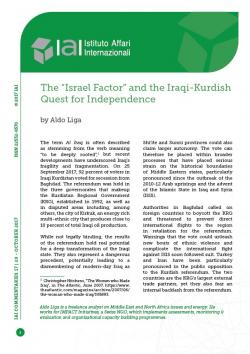The "Israel Factor" and the Iraqi-Kurdish Quest for Independence
The “Israel Factor” and the Iraqi-Kurdish Quest for Independence
Aldo Liga*
The term Al Iraq is often described as stemming from the verb meaning “to be deeply rooted”,[1] but recent developments have underscored Iraq’s fragility and fragmentation. On 25 September 2017, 92 percent of voters in Iraqi Kurdistan voted for secession from Baghdad. The referendum was held in the three governorates that makeup the Kurdistan Regional Government (KRG), established in 1992, as well as in disputed areas including, among others, the city of Kirkuk, an energy rich multi-ethnic city that produces close to 10 percent of total Iraqi oil production.
While not legally binding, the results of the referendum hold real potential for a deep transformation of the Iraqi state. They also represent a dangerous precedent, potentially leading to a dismembering of modern-day Iraq as Shi’ite and Sunni provinces could also claim larger autonomy. The vote can therefore be placed within broader processes that have placed serious strain on the historical boundaries of Middle Eastern states, particularly pronounced since the outbreak of the 2010-12 Arab uprisings and the advent of the Islamic State in Iraq and Syria (ISIS).
Authorities in Baghdad called on foreign countries to boycott the KRG and threatened to prevent direct international flights to the region in retaliation for the referendum. Warnings that the vote could unleash new bouts of ethnic violence and complicate the international fight against ISIS soon followed suit. Turkey and Iran have been particularly pronounced in the public opposition to the Kurdish referendum. The two countries are the KRG’s largest external trade partners, yet they also fear an internal backlash from the referendum. This is mainly due to the presence of a significant Kurdish minority in both countries, around 15 million in Turkey and 7-8 million in Iran (compared to the 5.3 million residing in the KRG). On 16 October, clashes between Iraqi and Kurdish forces were reported south of Kirkuk, rising tensions further.

Source: University of Texas Libraries.
In the run up to the referendum, Turkey threatened to impose sanctions on the KRG and moved troops near the border, where a joint Turkish-Iraqi military exercise was held. Iran closed its land border and airspace to flights directed towards Northern Iraq. The White House called the vote “provocative and destabilizing”, with “no international legitimacy”.[2] Even the US Congress — where Iraqi Kurds enjoy important support — has moved to subordinate military support to the Kurds in their fight against ISIS on the KRG remaining part of the Iraqi state.[3] The Russian position is more nuanced, since the country recently secured new energy deals with the KRG.
Among regional and international powers, only Israel publicly endorsed the referendum and its result. This should not be surprising, however. The enduring bonds between two regional minorities – Jews and Kurds – developed since the 1960s through military, economic and cultural cooperation. Most of this empathy stems from a shared history of persecution, a struggle to preserve their identity and ultimately secure a state of their own amidst the opposition of regional neighbours.
On the eve of the referendum, many Israeli flags appeared during Masoud Barzani’s speech at the Franso Hariri Stadium in Erbil (Barzani has been leader of the Kurdistan Democratic Party (KDP) and President of KRG since 2005). On 12 September, Israel Prime Minister Benjamin Netanyahu expressed his support for the “legitimate efforts of the Kurdish people to attain a state of its own”.[4]
The prospect of an independent Iraqi Kurdistan is indeed strategically important for Israel. Relations between Israel and Iraqi Kurdistan gained momentum and visibility with the visits of Mustafa Barzani (father of Masoud) to Israel in 1968 and 1973. Relations evolved around three main pillars: security cooperation (intelligence and military training in particular), economic cooperation (energy, construction, agricultural technology and communication) and culture (a Jewish Affairs Directorate was set up within the Kurdish Ministry of Endowment and Religious Affairs in 2015;[5] also interesting is the fact that the memoir of former Israeli Prime Minister Golda Meir is apparently a best-seller in Iraqi Kurdistan).
From the Israeli standpoint, an independent Kurdish state in Northern Iraq would help dilute regional threats, serving as a buffer against Iranian influence, blocking Iran’s design of a “Shi’a crescent” linking Iran, Iraq, Syria and Hezbollah in Lebanon. Kenneth M. Pollack, a former Central Intelligence Agency (CIA) analyst and National Security Council official, has noted that “Israel is desperate for friends in the region, the Kurds generally want to be friends, and they don’t care about Palestine. [...] An independent Kurdistan will be a base for Israeli operations against Iran, via Iran’s Kurdish population.”[6] At the same time, the Kurds have long seen Israel as a strategic regional partner in both economic and political terms.
Once again, therefore, Israel’s support for the Kurdish referendum may also reflect the continuation of a long held tradition of manipulation of the Kurdish cause to serve the interests of external or regional players.
That said, does Israel’s vocal support for Kurdish independence help advance or hinder the Kurdish cause? In light of the scepticism shared by many Middle East observers about the actual capability of the Kurdish government to claim statehood (because of its landlocked territory, debt-laden and oil-dependent economy), the vote will probably lead to renewed negotiations between Erbil and Baghdad on some form of increased autonomy or confederation.
Yet, if independence and separation become a reality, Israel’s public endorsement risks endangering the entire process, delegitimizing the Kurdish cause. It will represent a blatant interference in the internal affairs of a country with which Israel does not share borders or diplomatic relations. Indeed, prominent political leaders have already warned against the creation of a “second Israel” in the region,[7] and Turkish and Iranian leaders have both pointed to a supposed role of Israel’s Mossad in the Kurdish referendum.[8]
If, conversely, the referendum results in a gradual reforming of the dysfunctional relationship between Erbil and Baghdad, through the establishment of a confederation or a truly federal system, this secretive relationship could result in a more win-win scenario. Indeed, cross-border cooperation between Israel and the KRG has already had beneficial side effects. This is particularly true for the energy sector, where Israeli-KRG relations have contributed to forge new economic zones that transcend old hostilities. For instance, the oil flowing from Iraqi Kurdistan to Israel through Turkey (via the Taq-Taq oil field, connected to the Kirkuk-Ceyhan pipeline) sustained Kurdistan’s war efforts against ISIS as well as Israel energy needs.
Significantly, this “energy triangle” was set up despite the six-year diplomatic standoff between Turkey and Israel. Now that relations are normalizing and despite recent threats to reconsider this process,[9] cross-border cooperation could reach new heights and be further improved thanks to new energy discoveries in the Eastern Mediterranean and untapped gas deposits in Iraqi Kurdistan,[10] with positive spillovers in terms of political dialogue and interdependence.
From this point of view, the longstanding relationship between Israel and the Kurds of Iraq could potentially become a driver for stability in shaping the future Middle East. Yet in order for this scenario to become a reality, continued secretive dialogue between Israel and a KRG within a reformed Iraqi state framework would represent the best outcome. A more open state-to-state relationship would instead become a recipe for further regional turmoil and disruptions, even potentially becoming a trigger factor for renewed conflict and violence.
Clashes in the outskirts of Kirkuk since 16 October represents a warning sign for the potential for conflict. Israel’s open and public support for Kurdish independence may even result in renewed tensions between Israel and Turkey. Such a scenario would burry those benefits the grew out of the secret cooperation between Israel and the KRG over the course of the past years and ultimately result in a more fractured and tension ridden Middle East for both Israel and the Kurds.
* Aldo Liga is a freelance analyst on Middle East and North Africa issues and energy. He works for IMPACT Initiatives, a Swiss NGO, which implements assessments, monitoring & evaluation and organizational capacity building programmes.
[1] Christopher Hitchens, “The Women who Made Iraq”, in The Atlantic, June 2007, https://www.theatlantic.com/magazine/archive/2007/06/the-woman-who-made-iraq/305893.
[2] The White House, Statement by the Press Secretary on the Kurdistan Regional Government’s Proposed Referendum, 15 September 2017, https://www.whitehouse.gov/the-press-office/2017/09/15/statement-press-secretary-kurdistan-regional-governments-proposed; US Department of State, Press Conference by Special Presidential Envoy McGurk in Erbil, Iraq, 14 September 2017, https://www.state.gov/s/seci/2017remarks/274148.htm.
[3] Bryant Harris, “Congress Threatens to Cut Payments to Iraqi Kurds If They Break with Baghdad”, in Al-Monitor, 28 June 2017, http://almon.co/2vuj.
[4] Israel Ministry of Foreign Affairs, Statement from PM Netanyahu Regarding the PKK Organization, 12 September 2017, http://mfa.gov.il/MFA/PressRoom/2017/Pages/Statement-from-PM-Netanyahu-regarding-the-PKK-organization-12-September-2017.aspx.
[5] Matt Alesevich, “Iraq’s Kurdish Jews Look to the Future with Hope and Scepticism”, in Middle East Eye, 25 June 2017, http://www.middleeasteye.net/node/64228.
[6] David M. Halbfinger, “Israel Endorsed Kurdish Independence. Saladin Would Have Been Proud”, in The New York Times, 22 September 2017, https://nyti.ms/2jQnHOt.
[7] “‘We Won’t Allow the Creation of a Second Israel,’ Iraq Warns Ahead of Kurdistan Independence Vote”, in Haaretz, 18 September 2017, https://www.haaretz.com/middle-east-news/iraq/1.812853.
[8] “Erdogan: Israeli Mossad Involved in Kurdish Referendum; Hezbollah: It’s a U.S.-Israeli Plot”, in Haaretz, 1 October 2017, https://www.haaretz.com/middle-east-news/1.815008.
[9] Barak Ravid, “Erdogan Threatens to Freeze Normalization if Israel Doesn’t Drop Support for Kurdish Independence”, in Haaretz, 26 September 2017.
[10] Dmitry Zhdannikov, “Russia’s Rosneft Clinches Gas Pipeline Deal with Iraq’s Kurdistan”, in Reuters, 18 September 2017, https://reut.rs/2xKy1hi.
-
Details
Roma, IAI, October 2017, 4 p. -
In:
-
Issue
17|20



